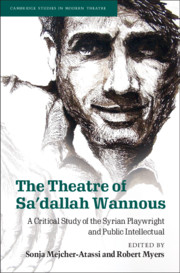Book contents
- The Theatre of Sa’dallah Wannous
- Cambridge Studies in Modern Theatre
- The Theatre of Sa’dallah Wannous
- Copyright page
- Contents
- Figures
- Contributors
- Acknowledgments
- Notes on Transliteration and Translation
- Chronology of Wannous’ Life, Plays, and Selected Writings
- Introduction
- Part I Situating Wannous
- Part II Reading Wannous
- 3 Keeping Silent, or the Silence That Kept Wannous
- 4 The Failure of Revolutionary Humanism: Reading Wannous with Fanon
- 5 Historiography as Resistance in the Later Plays of Wannous
- Part III Staging Wannous
- Part IV Remembering Wannous
- List of Wannous’ Plays
- Summaries of Wannous’ Principal Plays
- Bibliography
- Index
5 - Historiography as Resistance in the Later Plays of Wannous
from Part II - Reading Wannous
Published online by Cambridge University Press: 14 May 2021
- The Theatre of Sa’dallah Wannous
- Cambridge Studies in Modern Theatre
- The Theatre of Sa’dallah Wannous
- Copyright page
- Contents
- Figures
- Contributors
- Acknowledgments
- Notes on Transliteration and Translation
- Chronology of Wannous’ Life, Plays, and Selected Writings
- Introduction
- Part I Situating Wannous
- Part II Reading Wannous
- 3 Keeping Silent, or the Silence That Kept Wannous
- 4 The Failure of Revolutionary Humanism: Reading Wannous with Fanon
- 5 Historiography as Resistance in the Later Plays of Wannous
- Part III Staging Wannous
- Part IV Remembering Wannous
- List of Wannous’ Plays
- Summaries of Wannous’ Principal Plays
- Bibliography
- Index
Summary
This chapter examines Sa’dallah Wannous’ use and interrogation of history as means of carving out a space for critical reflection on pressing contemporary issues such as state violence. It focuses on two of Wannous’ late plays, Historical Miniatures and Drunken Days and argues that Wannous’s highly literary dramatic language consistently interrogates history and tradition. The chapter also includes an analysis of two significant productions of Historical Miniatures, one in Beirut in 2000, staged by the renowned Lebanese director Nidal al Achkar, and the other a daring site-specific production in the prison area of the actual thirteenth-century citadel in Damascus where the play is set, by Syrian director Naila Al-Atrash, which was staged shortly after Wannous’ death in 1997. Since the citadel had been used to house political prisoners during the early years of the regime of Hafez al-Assad, who died three years later, Al-Atrash’s production was inevitably interpreted as a pointed critique of the Syrian state’s continuing use of violence and incarceration as means of suppressing dissent.
Keywords
- Type
- Chapter
- Information
- The Theatre of Sa'dallah WannousA Critical Study of the Syrian Playwright and Public Intellectual, pp. 96 - 118Publisher: Cambridge University PressPrint publication year: 2021
- 1
- Cited by

